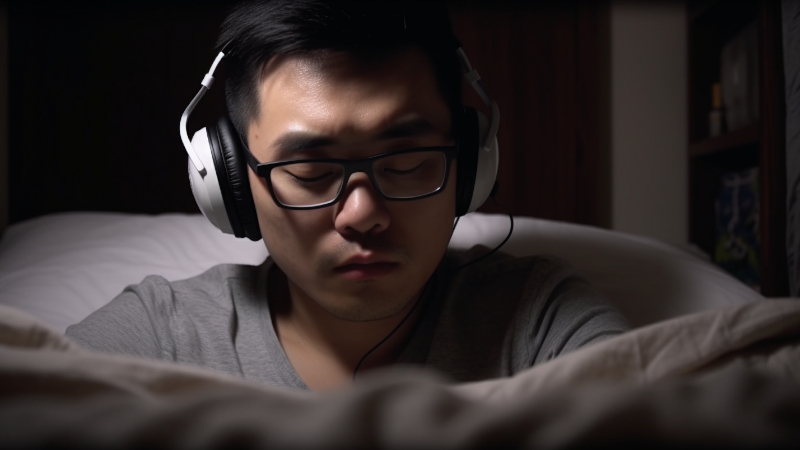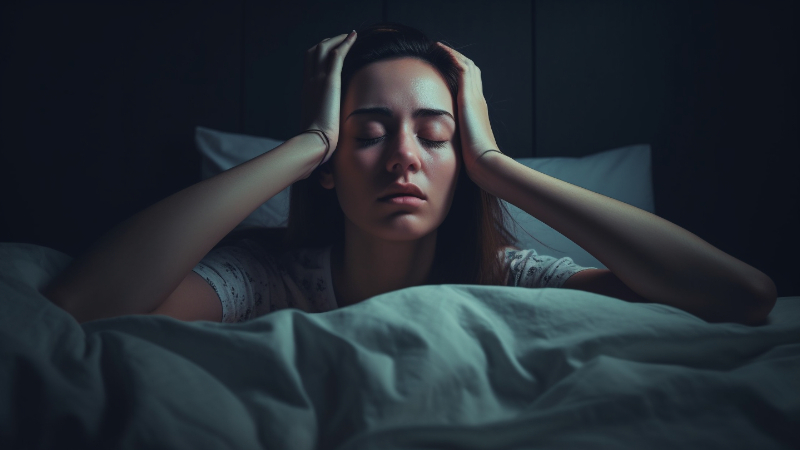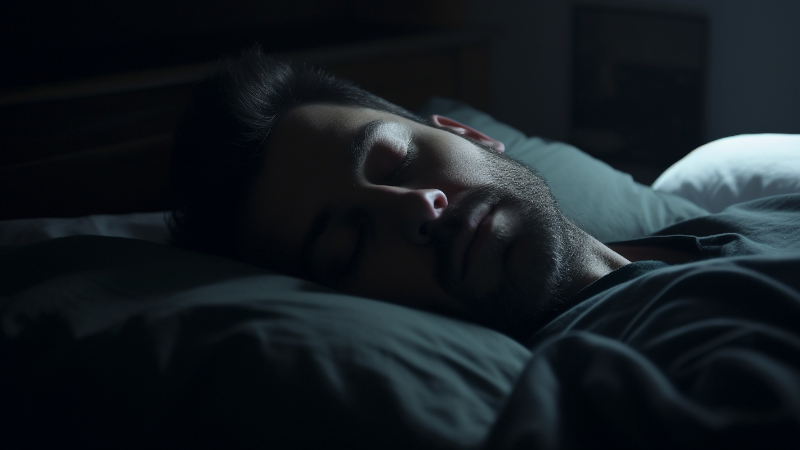A good night’s sleep is more than just a means to ward off grogginess the next day. It’s a cornerstone of good health, playing a pivotal role in maintaining both our mental and physical well-being. So, how does lack of sleep affect mental health? The complex connection between sleep and mental health has been a subject of growing interest, and rightly so.
Come with us as we delve into ten essential benefits of quality sleep for mental and physical health, emphasising the significance of the connection between sleep and mental health.
Table of Contents
How Does Lack of Sleep Affect Mental Health?
Lower Risk of Mental Health Disorders
Adequate sleep is crucial in mitigating the risk of mental health disorders. The extent of which some would agree appears to be on the rise of late. This is no doubt connected for many to the lived experiences of the last few years.
So, how does sleep improve mental health? And, can lack of sleep cause mental breakdown? As we take a closer look at how a lack of sleep can cause an unwanted spiral of consequences, simply by getting quality sleep, your chances of exposure are greatly reduced.
The linkage between sleep and mental health is arguably strong in disorders such as depression, anxiety, bipolar disorder, and PTSD where sleep disturbances are a common symptom. The sleep and mental health statistics you can find online are jaw-dropping! 1
| Depression | Insomnia – It is not uncommon for those with depression to struggle with insomnia. This lack of restorative sleep can exacerbate feelings of sadness, hopelessness, and irritability. | Hyperinsomnia – Conversely, some people experience hypersomnia, where they sleep excessively but still feel unrested. This can lead to a vicious cycle where daytime fatigue, such as Myalgic Encephalomyelitis / Chronic Fatigue Syndrome (ME/CFS) reinforces depressive symptoms. 2 |
| Anxiety | Sleep Onset Insomnia – Anxiety can cause sleep onset insomnia, where sufferers find it hard to fall asleep due to racing thoughts or excessive worrying. This can create a feedback loop where the anxiety about not being able to sleep further prevents the relaxation necessary for sleep. | Nightmares and Night Sweats – Anxiety disorders can also lead to nightmares and night sweats, disrupting the sleep cycle and leading to fatigue and heightened anxiety during the day. |
| Bipolar Disorder | Manic Episodes – During manic episodes, it is not unheard of to experience a reduced need for sleep, staying awake for extended periods. This lack of sleep can further fuel manic behaviours, creating a cycle of heightened energy and decreased sleep. | Depressive Episodes – On the flip side, during depressive episodes, some might experience hypersomnia or difficulty getting out of bed, which can exacerbate depressive symptoms. |
| PTSD | Nightmares – Those living with PTSD often experience recurrent nightmares related to traumatic events, disrupting their sleep, and sometimes leading to fear of sleeping. | Hyperarousal – PTSD can also cause hyperarousal, where individuals remain in a state of heightened alertness during sleep, leading to fragmented sleep and difficulty achieving deep sleep stages. |
Some easy-to-apply strategies to consider to help you reduce risks connected to poor sleep could include the following.
Tip 1 – Breathwork and Relaxation Techniques
Practices like breathwork and similar relaxation techniques can reduce anxiety and promote feelings of calm, facilitating easier sleep and reducing the risk of mental health disorders.
If you can find some free recordings online, you’re off to a good start!
Or you could join a group like one facilitated by the beautiful team of Audrey and Tumai at the Ascension Academy. The great thing about joining a group like the Ascension Academy is they can speak to many questions on physical and mental state, including ‘how does sleep affect mental health?’
Tip 2 – Develop Good Sleep Hygiene
Good sleep hygiene is also supported by making sure you don’t have any devices in your bedroom. Even something as seemingly harmless as a TV in your bedroom can be quite destructive to your sleep hygiene. Give yourself the best chance you can – chuck that telly out and grab a good book instead.
We will go deeper into sleep hygiene some more a little later, I just didn’t want to let the sleepy cat out of the bag just yet.
Tip 3 – Seek Professional Help
If sleep issues persist and you’re experiencing signs of a mental health disorder, seek professional help. There is no shame in asking for support if you need it.
My Grandfather always said to me “We are not machines. We break down from time to time. Machines also break down from time to time, particularly if they aren’t serviced when needed. Sometimes we need someone else to look under the hood for us.”
Early detection and treatment of mental health problems can significantly improve your quality of life. And as a result, your sleep quality too.
Understanding the detail behind the answer to ‘how does lack of sleep affect mental health’ is often the first step towards prioritising good sleep habits. Implementing these strategies covered so far, and the others to come, can significantly improve your sleep quality and overall mental and physical health.
It is no surprise that the connection between sleep and mental health is perhaps most evident in our mood. If you’re missing that usual sparkle in your eye, your smile is just a little off, or you’re too easily tuned out, these can impact on your mood.
How Does Better Sleep Benefit You?
Improved Mood
Have you ever felt like there just wasn’t a ‘right side of the bed’ to get out of some days? I feel your pain. A bad night’s sleep can crush even the most determined of us, and the battle scars show up for others to see all too eaisly.

Quality sleep can lead to better emotional regulation and mood improvement, reducing feelings of irritability, anxiety, and depression. And, a well-rested mind is better equipped to manage stress and maintain emotional balance.
So what are some simple tips you can use to help with improving mood through better sleep?
Tip 4 – Establish a Regular Sleep Schedule
Stick to a consistent sleep schedule, going to bed and waking up at the same time every day, even on weekends. This habit can regulate your body’s internal clock and could help improve your mood and emotional well-being.
Setting an alarm to help remind you it is time to start winding down for the night might be a good idea. Alarms don’t need to just be used to scare you out of bed in the morning. You can make your alarm your friend!
Tip 5 – Create a Relaxing Sleep Environment
Your bedroom should be a calm, quiet, and dark space. Blackout blinds can help to block the light from neighbouring buildings, street lights, and even that pesky full moon that seems to always through your sleep off.
What if you are in a noisy environment? You could consider trying earplugs or an eye mask with ear muffs.
If these aren’t comfortable for you to sleep with, maybe try a white noise machine or recording on your mobile.
Don’t overlook the value of comfortable bedding and a good quality mattress. These also contribute to creating a tranquil setting that promotes better sleep.

Tip 6 – Practice Mindfulness Meditation
Sometimes, simply stopping to take stock of what makes you happy can be enough to take your mind off the day-to-day worries. It’s amazing how after a little while you’ll feel a smile creep across your face.
Mindfulness, as a form of meditation focuses on breathing and awareness of the present moment. If you regularly practice this before bed you will likely feel a reduction in stress and anxiety, leading to improved mood and better sleep quality. Still that racing mind.
Boosted Cognitive Function
The relationship between sleep and mental health extends far beyond mood to cognitive abilities. Did you know that sleep enhances various aspects of brain function, including memory, decision-making, and creative thinking? 3
Proper sleep aids in the consolidation of memories, an essential process for learning new information. It also allows time for the right side of the brain to calm down, and the left side of the brain to enter into the conversation.
Ever wondered why some of the wisest and most successful people ‘sleep on’ things before making big decisions? Hmmm, yeah.
Try these pre-bedtime tips to sharpen your cognitive function and reclaim the edge that sleeplessness has taken from you.
Tip 7 – Limit Screen Time Before Bed
Did you know that the blue light emitted by screens can delay the release of sleep-inducing melatonin?
No only do they do this, but they also keep you on edge by increasing alertness and resetting your body’s internal clock.
Try to turn off all screens at least an hour before bedtime. Set an alarm for this as a reminder. And if you can, change the settings on your phone so it not only switches off the blue light but toggles to a black-and-white screen too.
Tip 8 – Regular Exercise
I know this sounds counterintuitive, but hear me out. Physical activity promotes better sleep.
Really, it does! As long as you’re not engaging in intense physical activity right before bed that is.
What it does is help you to fall asleep faster and enjoy deeper sleep. But wait! There’s more! Exercise can also boost your mood and reduce stress, further promoting better cognitive function.
Schedule a walk in the mornings and the evenings if you can. You could even set an alarm to remind you to get off your butt and shake that money maker. Just a thought.

Tip 9 – Consume Sleep-Promoting Foods and Drinks
Certain foods and drinks can indeed enhance your sleep quality. Almonds, walnuts, chamomile tea, and warm milk are known to promote sleep. Some people even turn to a broader spectrum of herbs from time to time to help slip away into dreamland. Valerian root is one that has been picking up a lot of attention lately.
Incorporating the right kinds into your diet can improve sleep and subsequently enhance cognitive function.
Pro tip: don’t chug down two gallons of herbal tea right before bed. This will have you up and down all night with the wrong kids of physical activity for sleep promotion.
Enhanced Physical Health
On our quest to understanding ‘how does lack of sleep affect mental health’ we can’t overlook the importance of physical health. Quality sleep plays a significant role in various aspects of physical health.
Stating the obvious much here, Matt?
Stick with me for a moment here. Sleep supports the recovery processes our bodies need. It helps maintain a healthy functioning heart and circulatory system, thus, reducing the risk of conditions like hypertension and heart disease. 4
Before I go on to the tips, it is worth noting that a healthy heart requires more than just quality sleep. For a little more insight into this take a closer look at our articles on active heart disease and congenital heart disease and how to avoid these.
Tip 10 – Sleep Posture
Yes. There is such a thing as sleep posture! It’s not all about slouching and copping a clip around the ear from your Grandmother.
Your sleeping position can have a significant impact on your physical health. For example, sleeping on your back with a pillow to support your natural curvature can prevent back and neck pain.
On the other hand, sleeping on your side can help reduce heartburn and acid reflux. But make sure you sleep on the correct side. That would be the side that best suits your specific needs according to the Sleep Foundation – I won’t steal their thunder, you’ll have to take a look for yourself. 5
Tip 11 – Avoid Nicotine and Caffeine
What!?! No coffee after dessert right before bed? Are you crazy?? No, well, I don’t think so. And here’s why.
You see, caffeine has this knack for throwing a wild party in your brain just when you’re trying to hit the hay. Picture this: You’re all snuggled up in bed, ready to drift into dreamland, but caffeine has other plans.
It invites all its rowdy friends over – Adenosine Blockers, they’re called – and they start playing loud music, dancing, and basically turning your brain into a nightclub that operates at full throttle, with no closing hours in sight! 6
Now, normally, Adenosine is the responsible adult in the room, encouraging everyone to calm down and get some rest. It usually binds to its favourite receptors in the brain, promoting relaxation and sleepiness.
But caffeine, being the party animal it is, blocks these receptors, preventing Adenosine from doing its job. It’s like caffeine steals Adenosine’s VIP pass to the chill-out lounge, leaving it stranded outside while the party ramps up inside.

So, with caffeine running the show, your brain is in full-on party mode, with every neuron dancing to the beat, making it nearly impossible to fall asleep. It’s like trying to sleep in the middle of a rave, with flashing lights, booming bass, and a relentless energy that just won’t quit.
Specialists normally advise that you should try to avoid consuming coffee, tea, or other caffeinated beverages (don’t even get me started on Coke) at least six hours before bedtime. And if you’re a smoker; consider quitting. Or at least cutting back; and then quitting. You can do this!
World No Tobacco Day comes around every year.
Tip 12 – Stay Hydrated
Dehydration can lead to a dry mouth and nose, potentially causing discomfort and disturbing your sleep. Overhydration on the other hand can have you up all night.
Drink plenty of water throughout the day, but be mindful not to consume large quantities before bedtime to avoid nighttime awakenings for bathroom trips across cold tile floors.
Stronger Immune Function
A well-rested body is better equipped to fight off illnesses. Rest is a strategic move that should never be underestimated when it comes to being ready and prepared for a targeted immune response. Get ready to recharge your Immune soldiers!
Mission 1 – Deep Sleep Phase: During the deep sleep phase, your body gets to work producing and deploying immune cells like cytokines and T-cells. It’s like a boot camp where your immune soldiers bulk up and get ready for battle. Collect 2 Sleep Points.
Mission 2 – Reducing Stress Hormones: Chronic sleep deprivation can lead to elevated levels of stress hormones like cortisol, which can suppress the immune response. Quality sleep ensures that cortisol levels are regulated, preventing your immune system from being hamstrung by stress. Collect 2 more Sleep Points.
Mission 3 – Promoting Healthy Gut Microbiome: There is a close connection between the gut and the brain, known as the gut-brain axis. Quality sleep supports a healthy gut microbiome, which in turn aids in immune function. It’s like fostering a peaceful kingdom where all the different entities (bacteria) work harmoniously for the greater good of the body. Collect another 2 Sleep Points.
Mission 4 – Enhanced Repair and Recovery: During sleep, the body goes into repair mode, fixing damaged cells and clearing out cellular waste. It’s like a nightly maintenance crew that comes in to clean up the mess and fix any wear and tear, ensuring everything is in tip-top shape for the next day. Collect 2 Sleep Points and 2 Bonus Points. You’re now a Level 10 Sleep Warrior!
So, how do we get through these 4 missions? Simple. Follow the tips.
Tip 13 – Avoid Late-Night Eating
Going to bed with a full stomach can disrupt your sleep. Avoid meals and alcoholic beverages for at least a couple of hours before bedtime. Let your body digest what you have consumed and you’ll notice the difference.
Tip 14 – Natural Sources of Vitamin D
Getting some sunlight during the day helps your body produce serotonin naturally. Did you know that serotonin is a neurotransmitter that not only lifts your mood but also promotes relaxation and sleep? 7

There’s nothing like clustering good things together to maximise your returns. Going for a walk on a sunny day not only helps you with hitting your activity goals, but if you practice some breathing exercises while listening to some calming music, your stroll in the sun will help you rack up those sleep points even faster.
Tip 15 – Stress Management Techniques
Chronic stress can impair your immune system and disrupt your sleep. Techniques such as yoga, deep breathing, and progressive muscle relaxation can help manage stress levels, promoting better sleep and a stronger immune function.
Knowing what triggers you and causes stress, and actively seeking to avoid those triggers when it is in your best interests is going to go a long way here too. It’s amazing what a little self-awareness can do!
Weight Management
Sleep impacts the hormones that control feelings of hunger and fullness. These are ghrelin, responsible for hunger, and leptin, responsible for fullness. Regular, quality sleep helps maintain a balance of these hormones and that goes a long way to aiding in managing weight. 8
Bada bing bada boom; there’s your link between quality sleep and weight management in a nutshell.
Tip 16 – Maintain Consistent Sleep Duration
Studies suggest that both short and long sleep durations can lead to weight gain. It is suggested to aim for about seven to nine hours of sleep each night for optimal health and weight management. 9
So, what do you need to do to get an uninterrupted 7 to 8 hours?
Is it time to change your bedroom layout? Maybe move your bedhead so it is against a wall instead of a window to avoid being so close to cold temperature drops at night?
Do you need to keep the door closed so your cat doesn’t stand on your chest and paw your face complaining you haven’t given her the usual midnight snack?
Make the changes you need to for you. This way you can be the best you for those you care about.
Tip 17 – Mindful Eating
Pay attention to what and when you eat. Avoid heavy meals and sugary foods near bedtime. Instead, opt for a small, light, healthy snack if you feel hungry before bed.
Avoid my teenage trick of ordering a pizza at 10 pm, and scoffing half of it down, only to wake up at 2 am with the MSG dry horrors.

Tip 18 – Temperature Control
There are 3 things I want to cover with you here that can help with temperature control. The actual temperature that works for you is going to be a personal thing in most cases. And as painfully obvious as it sounds, there may be some value here when you complete your own sleep assessment.
Check your thermostat settings: Make use of thermostat settings, if you have a climate control system installed, to maintain a consistent temperature throughout the night. Whatever you can do to avoid waking up on a sweat-soaked pillow and sheets, or a stiff neck and frozen jaw, is going to make a big difference.
Choose breathable bedding: Opt for breathable bedding materials like cotton to aid in temperature regulation. If you can sleep with layers of blankets rather than a duvet, you might find this helps you regulate your body temperature.
Layered clothing: Wear layered clothing to bed, if you can. If it is particularly cold, and you don’t have climate control, and your bedding isn’t up to scratch with keeping you warn, this might help. You should be able to easily adjust to your comfort level as the temperature changes throughout the night.
Increased Energy and Performance
Quality sleep leads to increased energy levels, better productivity, and enhanced physical performance. These aspects collectively improve one’s quality of life, highlighting the importance of sleep and mental health.
Tip 19 – Adopt a Balanced Diet
The food you consume impacts your energy levels and sleep quality. Not convinced? Check out what happens when you binge on junk food and sugar sweets. Try to incorporate a variety of fruits, vegetables, lean proteins, and whole grains into your diet.
Avoid heavy meals close to bedtime to prevent discomfort and disturbances during sleep. If you find that your digestion is a bit sluggish, and you need something to kickstart the fibre train, check out the Ultimate Fibre range.
I know I feel like I sleep a lot better when my digestion is running as it should.
Tip 20 – Regular Exercise
Wait! You covered exercise already!?!
Yep! And it is important, so it bears repeating.
Engaging in regular physical activity can help regulate your sleep patterns and boost your energy levels. 10
Just avoid intense workouts close to bedtime as they may interfere with your ability to fall asleep.
Tip 21 – Power Napping
A short nap during the day can help to improve mood, alertness, and performance.
However, naps should not be too long or too close to your regular bedtime as they could disrupt your nighttime sleep. If a nap is too long, you may slip into a deeper sleep and experience sleep inertia on the other side.
Sleep inertia can feel pretty close to a hangover for some people. And if you don’t pull out of it you may find that this, along with too long of a nap throws your circadian rhythms out enough to cause some disruption during the night.
Reduced Inflammation
Adequate sleep has been linked to reduced levels of inflammation and cell damage. 11 12
Whaaat??
Yep. It’s true.
Chronic inflammation is connected to many adverse health conditions, including heart disease, diabetes, and cancer. 13 14
Tip 22 – Limit Alcohol Consumption
While small amounts of alcohol can cause drowsiness, excessive consumption can disrupt the sleep cycle and increase inflammation levels in the body. Moderation is key.
Something else to consider is that alcoholic beverages that are loaded with sugar; ciders, mixers, etc. are going to do more harm than good regardless of your applied rationale. Consider how much sugar you are consuming with these, particularly before bed, as these types of beverages can bring with them a sleep-hostile sugar rush.
Tip 23 – Anti-Inflammatory Diet
Consuming foods rich in omega-3 fatty acids, like fatty fish (for the non-Vegans), walnuts, and flaxseeds, can help reduce inflammation. This dietary habit, along with quality sleep, can have a significant impact on your body’s inflammation levels. 15
Tip 24 – Regular Health Check-ups
I prefer to live by a methodology of addressing the potential for issues from a preventative perspective.
Regular health screenings can identify potential issues that may interfere with your sleep. If it’s later in the piece than that for you and something has sown up, then early intervention can help promote better sleep quality and, consequently, longevity.
Tip 25 – Cultivate a Positive Outlook
As we come to the end of the pondering of the question ‘How does lack of sleep affect mental health?’ the most important tip is saved for last.

Psychological health plays a significant role in overall longevity. Attitude is everything. Cultivating a positive outlook and managing stress effectively can not only improve your sleep quality, but it can also contribute to a longer, healthier life. 16
FAQs
How a lack of sleep affects your brain and personality?
So, how does the lack of sleep affect your mood? When you don’t get enough sleep, various changes happen in your brain that can affect your mood and how you behave.
For instance, the connections in your brain that help you learn and remember things don’t work as well, making it harder to remember new information. Your brain also has trouble balancing the chemicals that help you respond to events around you, which can slow down your reactions and make you feel more irritable or have mood swings.
Over time, not sleeping enough can even make you feel more impulsive, anxious, and withdrawn from social situations because it affects the parts of your brain that help you control your impulses and understand social cues.
A lack of sleep can also increase stress and inflammation in your body, which can further affect your brain’s health and function. It’s like throwing a wrench in the finely tuned machine of your body, disrupting the delicate balance that keeps everything running smoothly.
How does lack of sleep affect us physically mentally and socially?
Lack of sleep has a broad range of effects that can impact us physically, mentally, and socially.
Physically, it can lead to a weakened immune system, making us more susceptible to illnesses, and can also cause weight gain due to changes in the hormones that control appetite. It can even affect our heart health, increasing the risk of heart disease.
Mentally, sleep deprivation can impair our cognitive functions, including memory and attention, and can lead to mood swings and increased risk of mental health disorders such as depression and anxiety.
Socially, lack of sleep can make us more irritable and less able to understand social cues, which can lead to strained relationships and reduced social engagement. It can affect our performance at work or school, and reduce our ability to communicate effectively with others.
Conclusion
The intricate relationship between sleep and mental health cannot be overstated. Quality sleep is a pillar of health, deeply intertwined with our physical and mental well-being.
It’s a critical element in our journey towards a healthier lifestyle. By understanding the essential benefits of sleep, we can start to prioritise and improve our sleep habits, and consequently, improve our overall health.
Join the conversation on Instagram and Pinterest and let us know about your thoughts on how we have tackled the question ‘how does lack of sleep affect mental health?’
References
- “How Sleep Deprivation Impacts Mental Health” – Columbia University Faculty, 16 March 2022 [Columbia Universty] [Archive] ↩︎
- “Myalgic Encephalomyelitis/Chronic Fatigue Syndrome” – CDC Staff, 18 March 2023 [CDC] [Archive] ↩︎
- “The Neuroprotective Aspects of Sleep” – A. R. Eugene, J. Masiak, Date [PubMed] [Archive] ↩︎
- “Sleep and Heart Disease” – Victor Chang Staff, 13 January 2023 [Victor Chang Cardiac Insitute] [Archive] ↩︎
- “Side Sleeping: Which Side Is Best and How To Do It” – D. Pacheco, 14 August 2023 [Sleep Foundation] [Archive] ↩︎
- “Adenosine, caffeine, and sleep-wake regulation: state of the science and perspectives” – C. F. Reichert, T. Deboer, H. P. Landolt, 16 May 2022 [Journal of Sleep Research] [Archive] ↩︎
- “Serotonin” – Cleveland Clinic Staff, 18 March 2022 [Cleveland Clinic] [Archive] ↩︎
- “The Role of Sleep Curtailment on Leptin Levels in Obesity and Diabetes Mellitus” – M. Mosavat, M. Mirsanjari, D. Arabiat, A. Smyth, L. Whitehead, 23 March 2021 [Obesity Facts] [Archive] ↩︎
- “Adequate sleep to improve the treatment of obesity” – J. P. Chaput, A. Tremblay, 11 December 2012 [PubMed] [Archive] ↩︎
- “Exercising for Better Sleep” – Johns Hopkins Staff, Last Checked 12 September 2023 [Johns Hopkins Medicine] [Archive] ↩︎
- “How sleep deprivation can cause inflammation” – Harvard Health Staff, 11 January 2022 [Harvard Health] [Archive] ↩︎
- “Sleep and inflammation: partners in sickness and in health” – M. R. Irwin, 9 July 2019 [Nature] [Archive] ↩︎
- “Chronic inflammation in the etiology of disease across the life span” – D. Furman, J. Campisi, E. Verdin, P. Carrera-Bastos, S. Targ, C. Franceschi, L. Ferrucci, D. W. Gilroy, A. Fasano, G. W. Miller, A. H. Miller, A. Mantovani, C. M. Weyand, N. Barzilai, J. J. Goronzy, T. A. Rando, R. B. Effros, A. Lucia, N. Kleinstreuer, G. M. Slavich, 5 December 2019 [PubMed] [Archive] ↩︎
- “Why all the buzz about inflammation – and just how bad is it?” – R. H. Shmerling, 16 March 2022 [Harvard Health] [Archive] ↩︎
- “Positive Emotions and Your Health – Developing a Brighter Outlook” – H. Wein, August 2015 [NIH News in Health] [Archive] ↩︎
- “Omega-3 Fatty Acids for Your Health” – Arthritis Foundation Staff, 8 December 2022 [Arthritis Foundation] [Archive] ↩︎
Last Updated on 5 months by D&C Editorial Team


